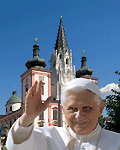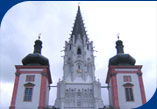ABSTRACT
The 850-year anniversary of the Sanctuary at Mariazell is accompanied by a number of church events and various steps of preparation. The texts in the Gospel of Lucas and the Acts of the Apostles are frequently read in 2007. Starting with the Feast of the Conception of Mary on December 8 until the wakes of Mariazell, the Feast of Mary's Birth on September 8th, a novena is being prayed in preparation of the celebrations with the Holy Father. Similar to a pregnancy, the spiritual preparation takes nine months. Readings from the Gospel of Lucas facilitate spiritual deepening. The final, recurring prayer is quoted from the encyclical letter "Deus Caritas Est" by Pope Benedict XVI. The included calling upon Mary to "Show us Christ!" suits with the motto of the Pope's visit: "To Look on Christ!" A series of impulses for homilies and concepts for monthly prayers have been made available under the title "You will be my witnesses." On the occasion of a visit to Rome in February 2007, members of parish councils from all dioceses presented Pope Benedict XVI. with the "Acts of the Apostles of the Presence" as a preparation of His visit to Austria. All parishes in Austria were invited to view their experiences in the parishes as a sequel to the "Acts of the Apostles" and write them down. According to the motto "Lebensräume gestalten - Glaubensräume öffnen," the parish councils were elected on March 18, 2007, for the next five years. On September 8, parish council members will be blessed by the Holy Father. They will receive a copy of the Gospel of Lucas and the "Acts of the Apostles" with blank pages as a sign of their mission to rewrite the Acts of the Apostles today. "Getting up," which appears in the emblem of the Mariazell-Anniversary, poses a constant challenge for the Church to gain new understanding of the Gospel of Lucas: "God is taking place today."
_______________________________________________________________
Today. Yes, today. In 2007, we are reading the Gospel of Lucas which says: "God is taking place today."
At the beginning of the church year 2007, there is a variety of events taking place which is typical for the Church: the Sanctuary of Mariazell celebrates its 850-year anniversary. Pope Benedict XVI. agreed to come to Mariazell as a pilgrim on this occasion. Memories of the messages of the "Katholischer Kirchentag" arise. The parish council elections are pending. How do these things fit in with each other?
The texts in Lucas, the Gospel and the Acts of Apostles, are frequently read in 2007. This Gospel keeps everything together. I proclaim to you good news: (Lk 2:10) God is coming today.
In the first texts chosen for the preparation for Mariazell 2007, the Bishops refer to the Acts of the Apostles, where it says in the first chapter that the Apostles, the women, Mary and the brothers went up in the upper room and continued steadfastly in prayer and supplication (cf. Acts 1:13). What keeps all these people together? How does the Austrian Church, in the light of all differences, unsolved problems and questions, fit together and into today's society? And many people sigh: "Alas!" And so we come to the Holy Spirit who stands by our side, like Paul writes, "with groanings which can't be uttered [as] we don't know how to pray as we ought"(Rom 8:26).
Who opens his/her heart for God today will "get up," a term which appears in the emblem of the Mariazell-Anniversary and in Gen 12:1: "Get out of your country, [...]to the land that I will show you," says God to Moses at the beginning of the story. Exodus - a biblical motive for the human existence.
So many people in our country, from all over Europe, in the whole world are "getting up." Refugees and immigrants are looking for safety and decent opportunities. Pilgrims are looking for meaning and God's blessing. All people are driven by the longing for a change in their lives.
This is our story as well: "A Syrian ready to perish was my father [...]" (Deu 26:5). "For we don't have here an enduring city, but we seek that which is to come." (Hebr 13:14) As a Church, we want to let God lead us out of the captivity of the "still," which symbolizes the depressing decay of the familiar, and the "again," which aggressively obstructs the view of the future with images of a past full of power.
It is all about the new understanding of God "happening" and "taking place" today, also beyond the borders of the capacities of the Church. God has always been with the people. The spiritual way to understanding what the Gospels mean today leads to talking to people whose lives are carried by and who have come across God on their ways. This is where church renews itself.
The signal to "get up" was given by the Austrian Bishops in a pastoral letter released on the first Sunday in Advent 2006: Thus, we, the Austrian Bishops, invite pilgrims of all ages and circumstances, especially the new members of the parish councils to come to the wakes and anniversary of Mariazell on September 8, 2007, to receive a Papal blessing for their mission in the parishes.
The letter includes the following:
So we, the Archbishops and Bishops of Austria, invite all believers to help "build living space for faith" and experience their Christian faith as a source of joy. For this, we need God's help. The preaching of the Gospels in today's world has changed because it seems to be "completely done by humans without ever mentioning God ... The people have built a world in which finding God has become difficult." (Pope Benedict XVI.) It is essential to "get up" (motto of the wakes of Mariazell 2007) and start looking for God.
Starting with the Feast of the Conception of Mary on December 8 lasting until the wakes of Mariazell, the Feast of Mary's Birth on September 8, a novena is being prayed in preparation of the celebrations with the Holy Father. Similar to a pregnancy, the spiritual preparation takes nine months. A series of impulses for homilies and concepts for monthly prayers have been made available under the title "You will be my witnesses."
According to the motto "Lebensräume gestalten - Glaubensräume öffnen," 28.000 members of the parish councils were elected on March 18, 2007, for the next five years. The election fits in with the project of "getting up," as these 5-year elections pose challenges as well as opportunities. The election poses the question who is willing to engage in parish affairs for the next five years and take the responsibility that comes with it. In the electoral process, the parishes obey democratic principles. It is tempting to avoid such decisions or know who suits the job best. It is necessary to leave space for the Holy Spirit in the face of well-meant plans.
Before the election, the members of the parishes were invited to view their experiences in the parishes as a sequel of the "Acts of the Apostles" and write them down. These 656 accounts were collected in four volumes of "Acts of the Apostles of the Presence," uncensored and representing the variety of parishes. The representatives of the parish councils presented the collection to Pope Benedict XVI. in preparation of the Papal visit on the occasion of their journey to Rome in February 2007. This was a historic moment, a first "ad-limina-visit" of laypersons whose voluntary engagement and joint responsibility has been growing.
Pope Benedict XVI. had Archbishop Sandri express His gratitude to the parish councils in a letter. He thanked the members of the councils for their letters which gave the Pope an insight into the active church life in Austrian parishes. Then, the Holy Father was asking God to show His mercy and grace to all members of councils and all baptized Christians to strengthen their powers as "Apostles in our Time." (Archbishop Leonardo Sandri, Vice State General; letter to Bishop Egon Kappellari on March 15, 2007; N. 46.700). On September 8, parish council members will be blessed by the Holy Father. They will receive a copy of the Gospel of Lucas and the Acts of the Apostles with blank pages as a symbol of their mission to rewrite the "Acts of the Apostles Today".
From the beginning, the concept of the nine months of preparation has been the one of a "Great Novena." The prayer brochure had a first print run of several thousand copies. The readings chosen from the Gospel of Lucas include the "Today-Words" in Lucas - with provided short impulses the question of today's meaning of annunciation is being explored.
Do I let my heart be opened for these times and the people so that I can feel God's presence? Can I enter a conversation providing respect and attention? Am I able to find words for my faith to open spaces for it? Where does my faith prove a healing quality for pain, guilt and distress? What about hospitality? Am I thankful for my wealth and does it make me want to share it with others?
"How can this be?" This brings us to Mary who asks this question in the annunciation scene with the angel (Lk 1:34). We can see from this scene that annunciation is conversation, driven by question and answer. In which ways shall we preach and annunciate, how shall we open space for faith, how shall we create living space from the Gospels? One could quote St. Peter here: not "by our own power or godliness" can we do this (cf. Acts 3:12). But let's stay with Mary who announces a basic change in the Magnificat in Lk 1:46-55.
In His first encyclical letter Pope Benedict XVI. writes: "Magnificat anima mea Dominum", she says on the occasion of that visit, "My soul magnifies the Lord" (Lk 1:46). In these words she expresses her whole program of life: not setting herself at the center, but leaving space for God, who is encountered both in prayer and in service of neighbor-only then does goodness enter the world. (Deus Caritas Est 41) In the concluding prayer - a part of the Great Novena - Pope Benedict asks: Show us Christ. What is more suitable for Mariazell where the Statue of Grace points at Christ with a whimsical smile on her face so that everybody understands.
To look on Christ is the motto of the visit of Benedict XVI. to Austria. Through the Holy Spirit the love of God, God Himself, has become human in Jesus Christ - for you, for me, for everyone. Look at it and hold your breath. Listen when He talks to you. What shall we Christians do if not put Christ at the center? Each and everyone will experience the relationship with Christ in a different way and even Pope Benedict XVI. lets himself be contradicted in the God's presence.
Let us search for the presence of Jesus and lets look on Christ, the Resurrected. Jesus, your Son - the Son of God. You abandoned yourself completely to God's call and thus became a wellspring of the goodness which flows forth from him. Show us Jesus. Lead us to him. Teach us to know and love him, so that we too can become capable of true love and be fountains of living water in the midst of a thirsting world. Those who draw near to God do not withdraw from men, but rather become truly close to them (Deus Caritas Est 42).
God is "taking place." Today.
Dr. Wolfgang Müller
Department of Pastoral Care (Parish Councils' Representative)




 1
1 

